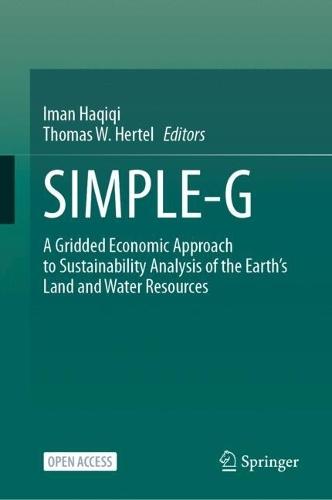Overview
This is an open access book. Crafted for both the economist and the curious mind, this book introduces a novel approach to blending economic and biophysical sciences to enable multi-scale analysis of a range of sustainability challenges confronting the world’s land and water resources at both local and global scales. It focuses specifically on the interface between the environment and food systems, utilizing economic theory to structure the overall framework. However, within the SIMPLE-G framework, there is ample room to incorporate fine-scale biophysical knowledge from agronomy, climate science, ecology, geography, hydrology, as well as a range of socioeconomic considerations. This enables multi-scale analyses incorporating grid cells that can vary in size from 250 meters to sub-regional scales. This, in turn, allows for investigation of global change drivers’ impacts on local sustainability, as well as feedbacks from local sustainability policies to regional and global outcomes. The book opens with a foreword by a prominent sustainability scientist, Prof. Navin Ramankutty, and proceeds in five parts covering, respectively: (1) introduction and overview, (2) basic economic theory underpinning SIMPLE-G, (3) the SIMPLE-G framework, including structure, data, parameters, computer implementation, and validation, (4) eight diverse applications of the SIMPLE-G framework, covering a range of geographies and sustainability challenges, and (5) a forward-looking chapter on future directions. The book provides step-by-step guidance on building and utilizing gridded models with real-world case studies demonstrating practical applications which will facilitate its use by academics, practitioners, and students conducting research on climate impacts, land-use, water resource management, food security, poverty, equity, nutritional outcomes, and overall sustainability.
Full Product Details
Author: Iman Haqiqi ,
Thomas W. Hertel
Publisher: Springer International Publishing AG
Imprint: Springer International Publishing AG
Edition: 2025 ed.
ISBN: 9783031680533
ISBN 10: 3031680537
Pages: 327
Publication Date: 29 October 2024
Audience:
College/higher education
,
Professional and scholarly
,
Tertiary & Higher Education
,
Professional & Vocational
Format: Hardback
Publisher's Status: Active
Availability: Not yet available

This item is yet to be released. You can pre-order this item and we will dispatch it to you upon its release.
Author Information
Dr. Iman Haqiqi is a leading agricultural economist at Purdue University, recognized for his research on global trade and sustainability. His work within the Center for Global Trade Analysis and the Global to Local Analysis of Systems Sustainability (GLASS), has contributed significantly to our understanding of interactions of international agricultural trade, land use, water resources, and climate change. Dr. Haqiqi’s approach to research is characterized by its global-to-local-to-global perspective, considering economic feedback and local conditions to address major sustainability and resilience challenges. His contributions to the field have earned him the prestigious Purdue Seed for Success Acorn Award, a testament to his innovative research. Dr. Thomas Hertel is Distinguished Professor of Agricultural Economics at Purdue University. Prof. Hertel’s research and teaching focuses on international trade, food and environmental security. He is a 2022 recipient of the Alexander von Humboldt Research Prize and is a Fellow, and a Past-President, of the Agricultural and Applied Economics Association (AAEA), Fellow of the American Academy for the Advancement of Science (AAAS) as well as the Australasian Agricultural and Resource Economics Society, and Honorary Life Member of the International Association of Agricultural Economists. He is also the founder and Executive Director of the Global Trade Analysis Project (GTAP) which now encompasses more than 28,000 researchers in 179 countries.




